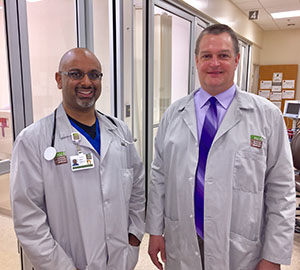Play it safe this summer
May 17, 2017

While summer brings birds that sing and skies that are blue, for some it brings scrapes, sprains, bug bites and greater potential for serious injuries too. Regardless of your age, your Northwest Community Healthcare (NCH) Immediate Care Center (ICC) physicians want you and your family to “play it safe” this summer by following these “tried and true” tips.
Wear a helmet
Larry Wellendorf, M.D., medical director of NCH’s ICCs, occupational and employee health services, recommends putting on a helmet before riding a motorcycle, all-terrain vehicle, bicycle or skateboard, or engaging in other activities posing a risk for head injury.
“I recall a young man who fell off his bicycle and cracked his helmet significantly. Had he not been wearing a helmet, he likely would have sustained a severe head injury,” says Dr. Wellendorf. “A helmet can save your life.”
According to the Insurance Institute for Highway Safety – Highway Loss Data Institute, Illinois is one of only three states without a law requiring a helmet be worn when riding a motorcycle. Before you choose to cruise on two wheels or a motorized four-wheeler without a helmet, consider the risk.
Proper padding
When slipping into in-line skates, riding a scooter or skateboard or taking part in other sports, elbow pads, knee pads, wrist guards and other protective gear are a must. Aakar Shah, D.O., NCH ICC physician in Lake Zurich, says proper safety gear can help protect your elbows, knees and wrists from a joint injury that could spell pain in your future.
A recent study published in the Journal of Rheumatic & Musculoskeletal Diseases reports post-traumatic arthritis is the reason for 12 percent of osteoarthritis cases of the hip, knee and ankle, affecting about 5.6 million people in the United States.
If you do experience a fall, and sustain a minor joint injury, Dr. Shah suggests rest, ice, compression (using an elastic wrap) and elevation (just think “R.I.C.E.”). “Don’t be afraid to come in for an evaluation. We have X-ray capability, which offers a quick way to diagnose or rule out subtle fractures,” says Dr. Shah.
Keep ‘em covered
Your feet take you everywhere, so take care of them this summer. Dr. Wellendorf says, “I have a personal experience with this one.”
As a youngster, he was enjoying a day outside in his bare feet until he stepped on a stump from a bush. “It popped right through the bottom of my foot,” he says. “I needed multiple sutures and, to this day, I can still remember how painful it was.”
According to Podiatry Today, even a small puncture wound can pose risk for infection, osteomyelitis (an infection of the bone) or other complications if left untreated.
Dr. Wellendorf explains, “The bottom of the foot is very sensitive in terms of nerve endings. Removing a foreign body, such as a rock, a wooden sliver, or a piece of glass can be very painful, because of the difficulty in anesthetizing areas of the foot.”
Don’t get burned
A must-have for you and your children’s skin in any season is sunscreen. Dr. Shah suggests following the American Academy of Pediatrics’ recommendation that children wear sunscreen that has a sun protection factor (SPF) 15 or greater that will protect them from both ultraviolet A (long-wave) and ultraviolet B (shortwave) rays.
“I treated a teenager who took a nap in the sun and came into our center with painful sunburn on his back, thighs, neck and upper arms,” he says. “Unfortunately, people tend only to think about the typical, short-term complications of sunburn, but it is important to consider the longer-term dangers, including the risk for developing skin cancer.”